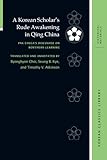A Korean Scholar's Rude Awakening in Qing China : Pak Chega's Discourse on Northern Learning / Pak Chega; ed. by John B. Duncan, Namhee Lee, Robert E. Buswell.
Material type: TextSeries: Korean Classics Library: Historical Materials ; 6Publisher: Honolulu : University of Hawaii Press, [2019]Copyright date: ©2019Description: 1 online resource (244 p.)Content type:
TextSeries: Korean Classics Library: Historical Materials ; 6Publisher: Honolulu : University of Hawaii Press, [2019]Copyright date: ©2019Description: 1 online resource (244 p.)Content type: - 9780824877934
- 9780824879808
- 951/.032 23
- DS708 .P28213 2019eb
- online - DeGruyter
- Issued also in print.
| Item type | Current library | Call number | URL | Status | Notes | Barcode | |
|---|---|---|---|---|---|---|---|
 eBook
eBook
|
Biblioteca "Angelicum" Pont. Univ. S.Tommaso d'Aquino Nuvola online | online - DeGruyter (Browse shelf(Opens below)) | Online access | Not for loan (Accesso limitato) | Accesso per gli utenti autorizzati / Access for authorized users | (dgr)9780824879808 |
Frontmatter -- Contents -- Acknowledgments -- Note on the Translation -- Translators' Introduction -- Translation -- Appendix: The Life of Pak Chega: A Chronology -- Notes -- Glossary -- Bibliography -- Index
restricted access online access with authorization star
http://purl.org/coar/access_right/c_16ec
Two years after Adam Smith's Wealth of Nations was published in 1776, Pak Chega's (1750-1805) Discourse on Northern Learning appeared on the opposite corner of the globe. Both books presented notions of wealth and the economy for critical review: the former caused a stir across Europe, the latter influenced only a modest group of Chosŏn (1392-1897) Korea scholars and other intellectuals. Nevertheless, the ideas of both thinkers closely reflected the spirit of their times and helped define certain schools of thought-in the case of Pak, Northern Learning (Pukhak), which disparaged the Chosŏn Neo-Confucian state ideology as inert and ineffective.Years of humiliation and resentment against the conquering Manchus blinded many Korean elites to the scientific and technological advances made in Qing China (1644-1911). They despised its rulers as barbarians and begrudged Qing China's status as their suzerain state. But Pak saw Korea's northern neighbor as a model of economic and social reform. He and like-minded progressives discussed and corroborated views about the superiority of China's civilization. After traveling to Beijing in 1776, Pak wrote Discourse on Northern Learning, in which he favorably introduced many aspects of China's economy and culture. By comparison, he argued, Korea's economy was depressed, the result of inadequate government policies and the selfishness of a privileged upper class. He called for drastic reforms in agriculture and industry and for opening the country to international trade. In a series of short essays, Pak gives us rare insights into life on the ground in late eighteenth-century Korea, and in the many details he supplies on Chinese farming, trade, and other commercial activities, his work provides a window onto everyday life in Qing China.Students and specialists of Korean history, particularly social reform movements, and Chosŏn-Qing relations will welcome this new translation.
Issued also in print.
Mode of access: Internet via World Wide Web.
In English.
Description based on online resource; title from PDF title page (publisher's Web site, viewed 02. Mrz 2022)


